 Petzlover
Petzlover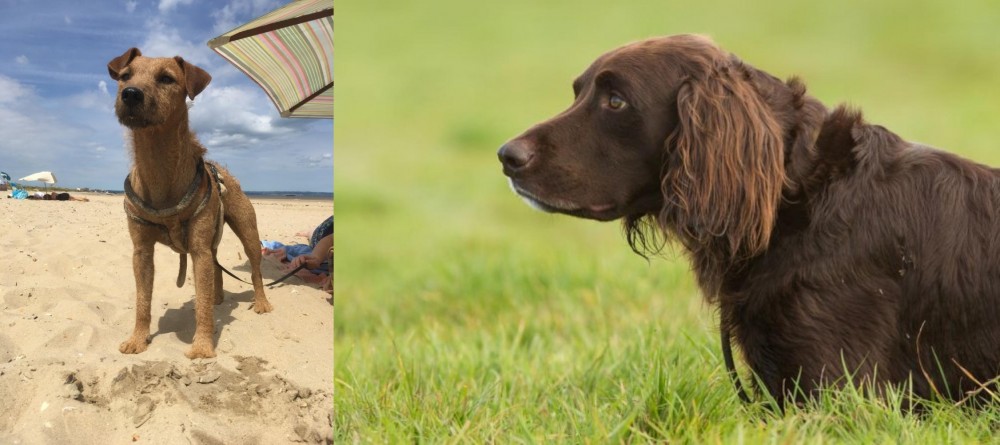 Fell Terrier is originated from United Kingdom but German Longhaired Pointer is originated from Germany. Fell Terrier may grow 32 cm / 12 inches shorter than German Longhaired Pointer. Fell Terrier may weigh 23 kg / 50 pounds lesser than German Longhaired Pointer. Both Fell Terrier and German Longhaired Pointer has same life span. Both Fell Terrier and German Longhaired Pointer has same litter size. Both Fell Terrier and German Longhaired Pointer requires Moderate Maintenance.
Fell Terrier is originated from United Kingdom but German Longhaired Pointer is originated from Germany. Fell Terrier may grow 32 cm / 12 inches shorter than German Longhaired Pointer. Fell Terrier may weigh 23 kg / 50 pounds lesser than German Longhaired Pointer. Both Fell Terrier and German Longhaired Pointer has same life span. Both Fell Terrier and German Longhaired Pointer has same litter size. Both Fell Terrier and German Longhaired Pointer requires Moderate Maintenance.
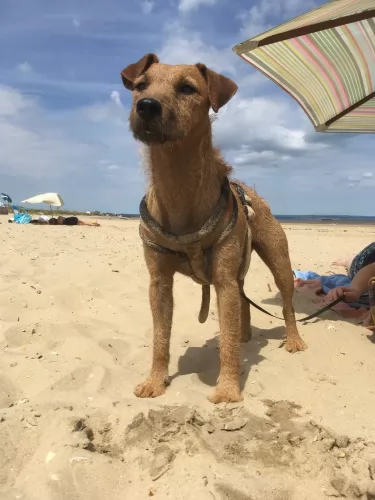 Fell terriers, known by other names such as Lakeland-, Patterdale-, Red Fell or Black Fell Terrier are small working terriers, hailing from the fell or hilly country of northern England.
Fell terriers, known by other names such as Lakeland-, Patterdale-, Red Fell or Black Fell Terrier are small working terriers, hailing from the fell or hilly country of northern England.
Several breeds have been developed from the Fell terrier, of which the Patterdale Terrier, Lakeland are some as well as other locally developed breeds. All these particular breeds are sometimes referred to as the Fell Terrier, and in fact the National Terriers Club LLC has published a Fell Terrier standard.
It is also believed that the long legged Fell Terriers may have descended from an old type of terrier referred to as the rough-coated Black and Tan. The Black and Tan Terrier is now extinct but was drawn into The Kennel Club as the Welsh Terrier.
 Looking at the German Longhaired Pointer you may think that you’re looking at a type of Setter dog or even a large Spaniel. These pointing dogs, hailing from Germany, are gun dogs or working dogs, having always been used to track game.
Looking at the German Longhaired Pointer you may think that you’re looking at a type of Setter dog or even a large Spaniel. These pointing dogs, hailing from Germany, are gun dogs or working dogs, having always been used to track game.
They were developed at the end of the 19th century, as breeders were specifically looking for a dog that was faster than the wiry- and short hair German pointers. Crossing English Setters and Pointers gave breeders this German Longhaired Pointer and the dog was shown for the first time in Germany in 1879.
Known as the GLP or Deutsch-Langhaar, the dog has the bloodlines of water dogs and scenthounds, and way back In 1897, Baron von Schorlemer wrote the first standard for the German Longhaired.
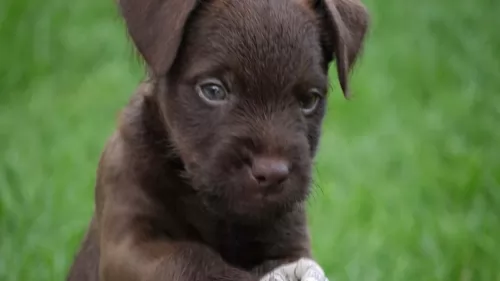 Small and feisty, the Fell Terrier is a working dog used for hunting purposes. He stands at roughly 31cm to 38cm in height and ways between 6 to 9kg.
Small and feisty, the Fell Terrier is a working dog used for hunting purposes. He stands at roughly 31cm to 38cm in height and ways between 6 to 9kg.
The dogs were sought after for their hunting skills as being the small dog they were, and with their narrow chests, they were able to move around in small, narrow underground tunnels.
The Fell has long legs, and his coat is shortish but with a rough texture to it. The coat is found in different colors such as white, black and tan, chocolate, red, black and bronze. The ears are medium length and floppy while the tail of the dog is traditionally docked, but these days the tail is often left long, and then he becomes less distinctive.
Used to having hunted in packs, the Fell Terrier has always been used to getting along well with other dogs. He makes a fantastic family pet and will get on well with children who have been been taught to respect animals. He is an independent, strong-willed dog and will certainly need socialization and training to turn him into an obedient dog.
He is energetic, fearless, strong-willed, determined and always ready for a game or some form of action.
 Athletic and lean, the German Longhaired Pointer is a medium to large sized dog standing at 60 – 70 cm in height and weighing 25 to 32kg.
Athletic and lean, the German Longhaired Pointer is a medium to large sized dog standing at 60 – 70 cm in height and weighing 25 to 32kg.
With his webbed feet, he can move with great speed. It is why the dog isn’t suited well to life in the city really, as he has always been a dog used to working and running over large areas. He will appreciate being with an active owner.
The beautiful double coat is medium length, slightly wavy and with feathering around the legs, chest and tail. The tail itself is carried stretched outwards or kept low. It is rich brown to coppery color, while some white can sometimes be found on the chest and paws. The attractive dog has brown eyes, a black nose and ears which are long and floppy.
Intelligent, gentle and amicable the German Longhaired Pointer is an affectionate, loyal dog who is also social, getting on well with other pets in the home as well as with children.
Being the loyal dog that he is, it makes him susceptible to separation anxiety so he should never be put into the backyard and left day after day on his own.
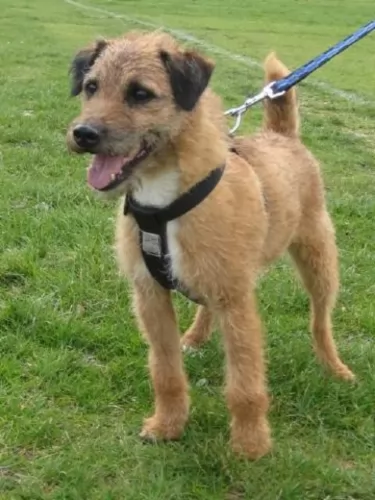 The Fell Terrier still has dreams of the hunt in him and with his strong prey instincts, he isn’t really suited to city living, but will fit ideally into life in the country.
The Fell Terrier still has dreams of the hunt in him and with his strong prey instincts, he isn’t really suited to city living, but will fit ideally into life in the country.
He is a high spirited, working dog with an endless amount of energy. He bonds closely with his human family, and for all his robust, larger-than-life attitude and boldness, when he is with his human family he can be gentle, calm and loving, just thriving on the love he receives.
Your Fell Terrier is just waiting to be your best friend and a never ending source of unconditional love.
 German Longhaired Pointers are calm, friendly dogs who want to please their owners. They’re really intelligent too so training and socialization won’t be difficult with this bright dog.
German Longhaired Pointers are calm, friendly dogs who want to please their owners. They’re really intelligent too so training and socialization won’t be difficult with this bright dog.
Once trained, he makes an excellent, loyal and loving family pet. With a firm, kind, consistent type of owner, the German Longhaired Pointer is guaranteed to make you a wonderful pet.
 Caring for your Fell Terrier requires knowing what do do with him when he develops certain common dog illnesses. He is a robust dog and is not likely to get any serious illnesses, but still you want to know about some of the more common ones.
Caring for your Fell Terrier requires knowing what do do with him when he develops certain common dog illnesses. He is a robust dog and is not likely to get any serious illnesses, but still you want to know about some of the more common ones.
If you suspect an illness, get your pet to the vet who can provide you with a treatment plan for your dog.
Your Fell Terrier can easily fall prey to dental disease if you don't brush his teeth at least 2 or 3 times a week. Unfortunately bad teeth isn't just a case of losing a tooth or two, bad teeth can cause serious diseases such as kidney disease. Tarter build-up progresses to infection of the gums as well as roots of the teeth. So serious is dental disease that your dog can actually have his life shortened.
Your Fell Terrier is a small dog and obesity can easily creep up if you don't control your pet's diet. Obesity is a serious illness that can increase problems with the joints and digestion.
 You’ll find that with an excellent diet and lots of love and care your German Longhaired Pointer can easily push 12 to 14 years of age.
You’ll find that with an excellent diet and lots of love and care your German Longhaired Pointer can easily push 12 to 14 years of age.
If you’re a novice dog owner, talking with your vet will give you a good idea of how to feed your dog to ensure longevity.
No matter how vibrant and energetic your pet is, there may well come a day when he is lethargic, he just wants to lie, he doesn't want to eat and he doesn’t jump up to greet you. Then it’s time for concern and to get your 4-legged friend to the vet.
There are several health problems associated with dogs that are worth researching – hip dysplasia, skin allergies, progressive retinal atrophy, allergies and cataracts.
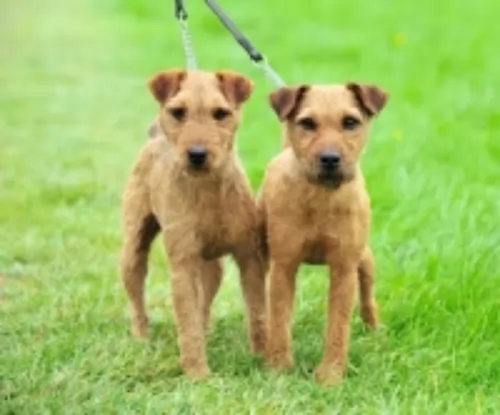 Your Fell Terrier is an active dog who won’t thrive if he is cooped up and ignored. He thrives on action and will need to be taken on walks with you and involved in all your games and sports, such as when you go jogging, swimming or cycling.
Your Fell Terrier is an active dog who won’t thrive if he is cooped up and ignored. He thrives on action and will need to be taken on walks with you and involved in all your games and sports, such as when you go jogging, swimming or cycling.
Feed your Fell Terrier the best quality commercially manufactured foods if you opt to feed your pet this way. Include cooked brown rice, vegetables and chicken into his kibble from time to time and always ensure there is cool, fresh drinking water available to him.
It depends on whether your Fell Terrier has a short, smooth coat, or the longer-haired coarse coat. He will certainly need brushing twice a week and sometimes, with the longer coats, he may require professional trimming or stripping.
Always check nails, in and outside the ears and remember to brush his teeth with canine toothpaste and toothbrush twice a week at least.
 German Longhaired Pointers have the same kind of nutritional needs as all other active working or sporting dog breeds. He needs high quality food, and if you feed him a commercially manufactured food, make sure its the best and that it has minerals and vitamins for active, large breeds. Most of the dog food companies have breed-specific formulas for size, age and activity levels of dogs.
German Longhaired Pointers have the same kind of nutritional needs as all other active working or sporting dog breeds. He needs high quality food, and if you feed him a commercially manufactured food, make sure its the best and that it has minerals and vitamins for active, large breeds. Most of the dog food companies have breed-specific formulas for size, age and activity levels of dogs.
Always ensure an ongoing supply of cool, fresh water is available to him.
The coat of the German Longhair can become matted and he will require brushing at least twice a week to keep the hair free of loose hairs as well as burrs that could lead to the coat becoming untidy and tangled. The ears will also have to be watched as thick matting can occur. Also check the inside of his ears to avoid dirt and wax build up which can lead to ear infections.
General grooming will also be reqired such as checking the length of the nails if they aren’t naturally worn down. Don’t neglect his teeth and brush 2 or 3x a week with canine toothpaste and toothbrush.
Your German Longhaired isn’t a dog who likes to spend his days lying round. He is energetic and loves to be on the go. From robust ball games to rope games, running with you as you go running, swimming or cycling, this dog can’t seem to get enough exercise and will want to be included in all your activities.